Avoiding certain foods is essential for maintaining ketosis on a ketogenic diet. Refined carbs and grains, such as white bread and pasta, provide high carbohydrate content that disrupts ketosis. Starchy vegetables like potatoes and corn also pose a challenge, as they exceed daily carb limits. Sugary snacks, including granola bars and flavored yogurts, lack nutritional value and introduce hidden sugars. Alcoholic beverages, especially beers and sweet wines, can contain unexpected carbs, hindering progress. Sweeteners and syrups rich in sugars are unsuitable, and processed foods often mask high carb counts. Further insights will enhance your keto journey's success.
Key Takeaways
- Avoid refined carbs and grains like white bread and pasta, which are high in carbohydrates.
- Steer clear of starchy vegetables such as potatoes and sweet potatoes due to their high net carb content.
- Limit sugary foods and snacks, including sodas and granola bars, which quickly disrupt ketosis.
- Skip high-carb snacks and sweetened beverages like candy bars and flavored yogurts that exceed daily carb limits.
- Be cautious with certain fresh fruits like bananas and grapes, which contain high levels of sugars.
Refined Carbs and Grains
When following a ketogenic diet, refined carbs and grains should be meticulously avoided due to their high carbohydrate content, which can impede the state of ketosis. For instance, a single slice of white bread contains approximately 13 grams of carbs, making it unsuitable for maintaining low-carb limits.
Similarly, a cup of cooked pasta has around 33 grams of carbs, while a half-cup of cooked rice contains about 26.5 grams of carbs. Additionally, traditional cereals and other high-carb breakfast foods should be avoided as they can quickly disrupt ketosis. These high-carb foods can quickly exceed the daily carbohydrate allowance vital for ketosis.
In lieu of these high-carb options, adopting keto friendly grains and refined carb alternatives is essential. Low-carb bread options, such as those made from almond or coconut flour, present a viable substitute.
Mashed cauliflower, a nutrient-dense option, can effectively replace traditional starchy sides like rice and pasta. Additionally, tortillas made from low-carb ingredients can greatly reduce overall carb intake without sacrificing versatility in meals.
Starchy Vegetables
Starchy Vegetables
Starchy vegetables, such as potatoes, sweet potatoes, corn, peas, beets, and yams, are high in carbohydrates, with a medium potato containing approximately 20 grams of net carbs.
These high-carb veggies can quickly exceed daily carb limits on a keto diet, making them unsuitable choices. Additionally, starchy vegetables lack the healthy fats found in keto-friendly options like avocados and nuts, which are vital for maintaining ketosis.
Instead, opting for low-carb alternatives like leafy greens, cauliflower, and zucchini can help maintain ketosis while still providing essential nutrients.
High-Carb Veggies to Avoid
Certain vegetables, particularly those high in starch, can hinder the progress of a ketogenic diet due to their increased carbohydrate content. These vegetables raise carbohydrate intake, making it challenging to maintain ketosis. Here are three high-carb vegetables to avoid:
- Potatoes: A medium potato contains approximately 20 grams of net carbs, which can greatly disrupt ketosis. Instead, consider keto vegetable substitutes to create low carb recipes that mimic the texture and flavor of potatoes.
- Sweet Potatoes: Similar to regular potatoes, sweet potatoes also average around 20 grams of net carbs per medium serving. Their high carbohydrate content makes them unsuitable for a keto diet, necessitating alternatives in meal planning.
- Corn: Known for its sugar and starch content, corn can notably increase daily carb intake. Avoid using corn in your dishes and opt for keto vegetable substitutes to adhere to low carb recipes.
Additional high-carb vegetables such as yams, artichokes, parsnips, and cassava should also be avoided.
These vegetables contribute to raised carbohydrate consumption, making it difficult to achieve the desired metabolic state on a ketogenic diet. By avoiding these high-carb options, one can better maintain ketosis and achieve dietary success.
Low-Carb Veggie Alternatives
Avoiding high-carb vegetables is a key strategy for maintaining ketosis, but selecting appropriate low-carb alternatives is equally important. Starchy vegetables such as potatoes, sweet potatoes, and corn are rich in carbohydrates, containing over 20g of net carbs per serving, making them unsuitable for a keto diet.
For instance, a medium-sized potato contains over 30g of net carbs, and sweet potatoes have approximately 20g of net carbs per medium potato, both of which exceed the daily carb limits for ketosis.
To adhere to a ketogenic lifestyle, opting for non-starchy vegetables is essential. Zucchini and cauliflower are excellent low-carb alternatives that can be used creatively in various dishes.
Zucchini noodles, with only 2.6g of net carbs per cup, offer a nutrient-dense substitute for traditional pasta, allowing for a significant reduction in carbohydrate intake. Similarly, cauliflower rice, containing just 3.2g of net carbs per cup, serves as a versatile and low-carb replacement for rice, providing a comparable texture and the ability to absorb flavors well.
Portion Control Tips
Managing portion sizes is fundamental to maintaining a state of ketosis, particularly when consuming starchy vegetables. To guarantee that your carbohydrate intake remains within the keto-friendly range, focus on limiting your consumption to 12-15 grams of net carbs from vegetables daily.
- Sweet Potatoes: A medium sweet potato contains approximately 20 grams of net carbs, which exceeds the recommended limit for a single serving. To incorporate sweet potatoes into your diet without disrupting ketosis, consider consuming a quarter of a medium sweet potato and complementing it with low-carb non-starchy vegetables.
- Peas: With up to 12 grams of net carbs per cup, peas should be consumed in smaller portions. Integrate meal timing strategies to distribute your carb intake throughout the day, guaranteeing you do not exceed daily limits. For example, consume a half-cup serving of peas and balance it with a protein-rich meal.
- Carrots: While carrots are nutritious, a medium carrot contains about 6 grams of net carbs. Moderation is key; consuming half a medium carrot can provide nutritional benefits without surpassing carb thresholds.
Pairing with hydration strategies, such as drinking water before meals, can aid in portion control and overall dietary adherence.
Sugary Foods and Snacks
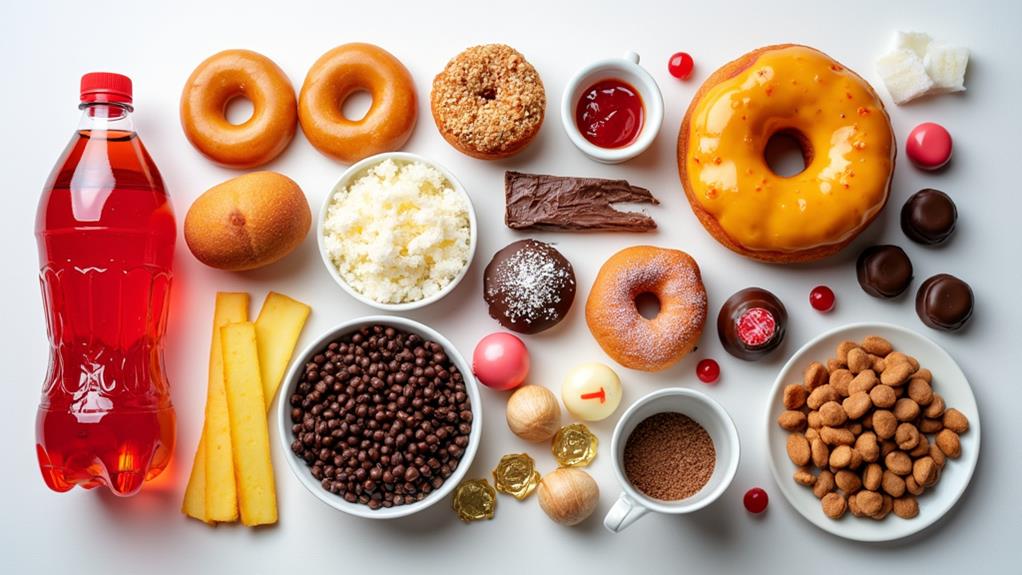
Sugary foods and snacks are significant pitfalls for those on a keto diet due to their high carbohydrate content and lack of nutritional value.
These foods can cause harmful blood sugar spikes, which can be particularly detrimental for individuals managing type 2 diabetes.
Beverages like sugary sodas can contain up to 39g of carbs per can, while snacks such as granola bars and dried fruits can exceed 15g and 18g of carbs per serving, respectively.
To maintain ketosis, it is essential to avoid these high-carb options and instead focus on nutrient-dense alternatives.
Hidden Sugars in Foods
When following a ketogenic diet, it is essential to be vigilant about hidden sugars in various foods and snacks, as they can easily derail your efforts to maintain ketosis.
Keto awareness involves scrutinizing food labels and being cautious about seemingly healthy options that may contain considerable sugar content.
For example, many flavored yogurts, despite their healthful appearance, often have added sugars. Some varieties may contain over 20 grams of carbohydrates per serving, which can greatly impact your daily carb limit.
Similarly, regular sodas like Coca-Cola are extremely high in sugar, with a 12-ounce can containing 39 grams of carbs, thereby quickly exceeding the carb limits recommended for a keto diet.
Granola bars, commonly marketed as healthy snacks, can also be laden with sugars. Some bars have upwards of 20 grams of carbs, making them unsuitable for maintaining ketosis.
To provide clarity, here are three examples of foods with hidden sugars:
- Flavored Yogurts: Over 20 grams of carbs per serving.
- Regular Sodas: 39 grams of carbs per 12-ounce can.
- Granola Bars: Upwards of 20 grams of carbs per bar.
High-Carb Snacks
Maintaining a ketogenic diet necessitates a keen awareness of high-carb snacks that can rapidly disrupt ketosis. Sugary snacks such as candy bars and chocolate-covered treats are particularly problematic, containing upwards of 20 grams of carbs per serving. This high sugar content not only spurs an insulin response but also exceeds the daily carb limits vital for maintaining ketosis.
Granola bars, often perceived as healthy, can harbor hidden sugars, with some varieties containing as much as 30 grams of carbs. Similarly, potato chips, though a popular snack, are low in nutrients and pack around 15 grams of carbs per serving, undermining keto goals.
Flavored yogurts, despite their probiotic benefits, can contribute over 20 grams of sugar per serving, making them an unsuitable choice for those adhering to a ketogenic diet. Trail mixes, which frequently include dried fruits and chocolate, can raise carb counts to over 25 grams per ounce, further complicating carb management.
For those committed to keto, exploring snack alternatives is essential. Keto friendly options such as cheese sticks, nuts, and vegetables with dip provide nutrient-dense, low-carb substitutes. These choices help sustain ketosis while offering variety and satisfaction.
Sweetened Beverages Pitfalls
Steering through the pitfalls of sweetened beverages is essential for anyone committed to the ketogenic diet. Sugary sodas, sweetened yogurts, and high-carb snacks can quickly derail ketosis due to their high carbohydrate content.
For instance, a 12-ounce can of Coca-Cola contains approximately 39g of carbs, a substantial barrier to maintaining ketosis. Similarly, flavored yogurts often harbor added sugars, raising their carb counts, hence plain, full-fat options should be chosen with caution.
Consider these critical points to avoid sweetened beverage pitfalls:
- Sugary Sodas: With around 39g of carbs per can, sugary sodas are best replaced with sweetened beverage alternatives such as sparkling water or unsweetened tea.
- Sweetened Yogurts: Opt for plain, full-fat yogurt, as flavored varieties can contain hidden sugars that raise carbohydrate intake.
- Alcoholic Beverages: Be cautious with beers and mixed drinks, which can contain high carb levels. Instead, consider low-carb alcohol options like dry wine or spirits paired with zero-carb mixers.
Implementing effective hydration strategies, such as drinking ample water and choosing low-carb beverages, can support adherence to the ketogenic diet while ensuring nutrient needs are met.
This approach minimizes the risk of inadvertently consuming excess carbohydrates.
Alcoholic Beverages
Alcoholic Beverages
Steering through alcoholic beverages on a keto diet requires careful consideration due to the high carbohydrate content in many popular options. Beer, for instance, is particularly high in carbohydrates, with popular brands containing around 12-20 grams of carbs per 12-ounce serving. This carbohydrate load can swiftly exceed the daily limits permissible on a ketogenic diet, potentially disrupting ketosis.
Additionally, the types of fats consumed can greatly impact cholesterol levels, making it essential to choose wisely.
Mixed drinks present another challenge, often infused with added sugars and syrups. A piña colada, for example, can contain approximately 32 grams of net carbs. Such high carb counts make these beverages unsuitable for those aiming to maintain ketosis.
Similarly, sweet wines can be problematic, with many varieties surpassing 5-7 grams of carbs per serving.
For those seeking keto friendly cocktails, opting for low-carb options like spirits (vodka, gin, whiskey) served with soda water or other low-carb mixers is advisable.
Light beers, while lower in calories, still contain around 6 grams of carbohydrates per 12-ounce serving, which can accumulate quickly.
As a result, alcohol moderation is essential. By choosing low-carb beverages and monitoring intake, individuals can enjoy occasional drinks without compromising their ketogenic goals.
Sweeteners and Syrups

When following a ketogenic diet, it is essential to avoid sweeteners and syrups such as honey, maple syrup, and high-fructose corn syrup due to their high carbohydrate content and potential to spike insulin levels.
These sweeteners have a high glycemic index, making them unsuitable for maintaining ketosis. Even seemingly small amounts, like the carbs found in sugary condiments or certain sugar-free sweeteners, can accumulate and disrupt ketosis.
Monitoring and choosing appropriate sweeteners is vital to maintaining the low-carb requirements of the keto diet.
High Carb Content
Maneuvering the keto diet requires meticulous attention to carbohydrate intake, particularly when it comes to sweeteners and syrups. These seemingly small additions can greatly disrupt ketosis and derail your dietary goals. Proper carb counting and meal planning are essential to guarantee you're not inadvertently consuming excessive carbs.
Here's a closer look at the high carb content of common sweeteners and syrups:
- Honey: With about 17g of carbs per tablespoon, honey is a high-sugar option that can easily disrupt ketosis. Despite its natural origin, honey is not suitable as a sugar alternative on a keto diet.
- Maple Syrup: Containing approximately 13g of carbs per tablespoon, this sweetener's high sugar content makes it incompatible with keto meal planning. Even small portion sizes can lead to exceeding daily carb limits.
- Regular Table Sugar and High-Fructose Corn Syrup: Both are high-carb sweeteners that should be completely avoided. They can greatly increase daily carb intake and negatively impact energy levels and nutrient density.
Careful examination of food labels and thoughtful meal timing can help maintain a balance of healthy fats and low-carb alternatives, supporting a successful keto journey.
Insulin Spike Risk
Understanding the risk of insulin spikes is essential for anyone following a keto diet, as these can greatly interfere with achieving and maintaining ketosis.
Sugar-based sweeteners like honey and maple syrup contain approximately 17g and 13g of carbs per tablespoon, respectively. Such high carbohydrate content poses a significant risk of insulin spikes, which can lead to insulin resistance and disrupt the metabolic state of ketosis.
High-fructose corn syrup, commonly found in processed foods, is another culprit that can cause rapid increases in insulin levels due to its high sugar content. This makes it vital to strictly limit its intake to avoid compromising keto dietary goals.
Even condiments such as flavored yogurts, ketchup (3g carbs per 9-gram packet), and barbecue sauce (4g per packet) often contain added sugars that can similarly disrupt ketosis by causing insulin spikes.
To manage sugar intake effectively and prevent insulin spikes, incorporating sugar alternatives is advisable.
Sugar-free sweeteners can help maintain stable blood sugar levels and support the metabolic processes essential for a successful keto diet. By avoiding high-carb sweeteners and opting for low-carb alternatives, one can better navigate the challenges of maintaining ketosis.
Hidden Sugars Alert
Hidden sugars can be a significant obstacle for those adhering to a keto diet, particularly when they are lurking in commonly consumed sweeteners and syrups. Many natural sweeteners, such as honey, contain approximately 17g of carbs per tablespoon, making them unsuitable for a keto diet.
Similarly, maple syrup provides about 13g of carbs per tablespoon, which can quickly exceed daily carb limits.
To maintain ketosis and achieve success, awareness of hidden sugars in various condiments is essential. For example, added sugars in ketchup can contribute around 3g of carbs per 9-gram packet, emphasizing the need for low-carb options.
Barbecue sauce often contains about 4g of carbs per packet, highlighting the importance of reading labels to avoid hidden sugars in sauces.
While sugar substitutes can offer alternatives, it's vital to check for hidden carbs, as some may still impact your daily intake.
For ideal keto diet success, consider the following:
- Honey: Approximately 17g of carbs per tablespoon.
- Maple Syrup: Around 13g of carbs per tablespoon.
- Ketchup and Barbecue Sauce: Can contain 3-4g of carbs per packet.
Choosing low carb options and being diligent about ingredient labels can help avoid these hidden sugar pitfalls.
Processed Foods
Processed foods pose a notable challenge for those adhering to a ketogenic diet, primarily due to their high content of hidden sugars and carbohydrates. Items such as snack bars and low-fat snacks often mask their high carb counts, making it essential for individuals to scrutinize nutrition labels meticulously.
Pre-packaged meals are particularly problematic, frequently containing added sugars and refined carbohydrates that can easily push daily carb intake above the keto limit of 20-50 grams, thereby disrupting ketosis. Furthermore, it's essential to be aware of hidden carbs in sauces, processed foods, and alcoholic beverages that can further complicate carb management.
Many fast food items exacerbate this issue, laden with carbs and sugars that derail ketogenic goals. Unhealthy fats and excessive sugars in snack foods, like chips and granola bars, further sabotage keto efforts, often leading to unintended weight gain.
For a successful keto journey, meal prep is essential. By preparing meals at home, individuals can control ingredients and avoid hidden carbs and sugars.
Additionally, making healthy swaps can greatly improve adherence to the diet. For example, instead of using processed condiments like ketchup, which contains approximately 3g of carbs per packet, consider using homemade, sugar-free alternatives.
Being vigilant about these seemingly small choices can make a considerable difference in maintaining ketosis and achieving long-term success on the ketogenic diet.
Dried Fruits and Trail Mix
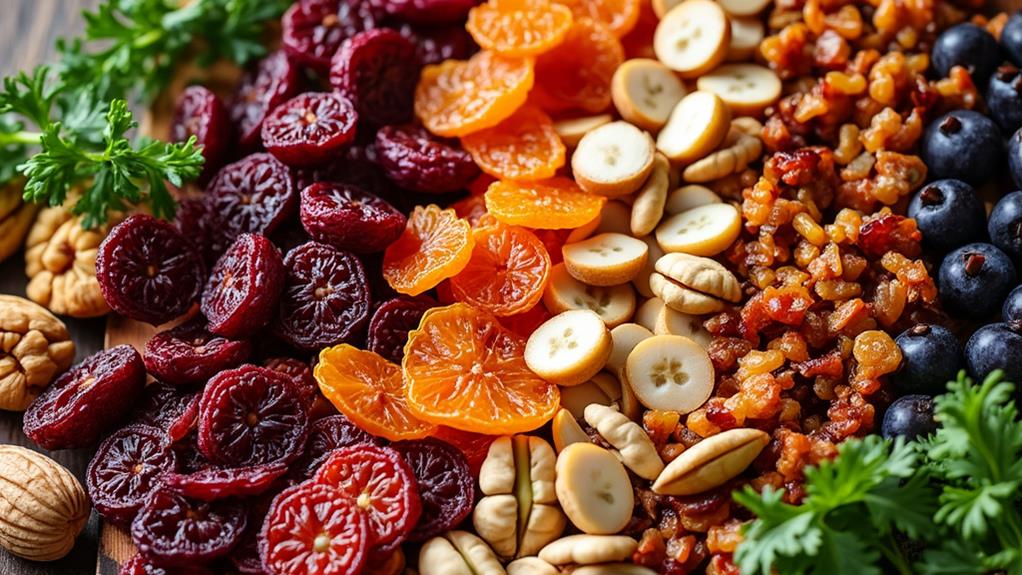
Dried fruits and trail mix, though often perceived as healthy snacks, are laden with carbohydrates that can easily disrupt the delicate balance of ketosis. For instance, a single Medjool date contains approximately 18 grams of carbs, rendering it a high-carb option unsuitable for a keto diet.
Furthermore, a quarter cup of mixed dried fruits can have up to 31 grams of carbs, which greatly exceeds the daily carb limits for many keto dieters. The sugar concentration increases when fruits are dried, resulting in higher carb counts compared to their fresh counterparts.
Particularly for diabetics following keto, managing carb intake is vital to maintaining stable blood sugar levels. Similarly, many commercial trail mixes contain added sugary ingredients, which can raise the carb content to over 12 grams per ounce.
For those seeking keto friendly snacks, it is essential to avoid these high-carb options. Instead, consider dried fruit alternatives that align with a ketogenic lifestyle.
Here are three keto-friendly alternatives:
- Fresh berries, such as raspberries, with under 4 grams of carbs per quarter cup.
- Nuts and seeds without added sugars or honey.
- Cheese crisps or pork rinds for a savory, low-carb snack.
Light or Low Fat Products
When steering through a ketogenic diet, it is crucial to be wary of light or low-fat products, as these seemingly healthy options often contain added sugars to compensate for the reduced fat content. This added sugar can considerably increase the overall carbohydrate content, thereby hindering the state of ketosis which is critical for the success of a keto diet.
For instance, many low-fat yogurts are laden with sugars, making them unsuitable for keto adherence. Similarly, low-fat salad dressings often contain hidden sugars, as manufacturers attempt to enhance flavor without the use of fats, leading to higher carbohydrate counts. It becomes imperative to scrutinize nutrition labels carefully; products marketed as "light" or "low fat" may not be the healthier option and can still contribute to raised carbohydrate intake.
| Product Type | Low-Fat Version (Carbs) | Full-Fat Version (Carbs) |
|---|---|---|
| Yogurt | High | Low |
| Salad Dressing | High | Low |
| Cheese | Moderate | Low |
| Milk | High | Moderate |
Opting for full-fat versions of dairy and dressings is generally better for keto compliance. These options provide the necessary healthy fats while avoiding the added sugars found in their low-fat counterparts. Therefore, choosing keto friendly substitutes and low carb alternatives guarantees the diet remains effective and nutrient-rich.
Certain Fresh Fruits
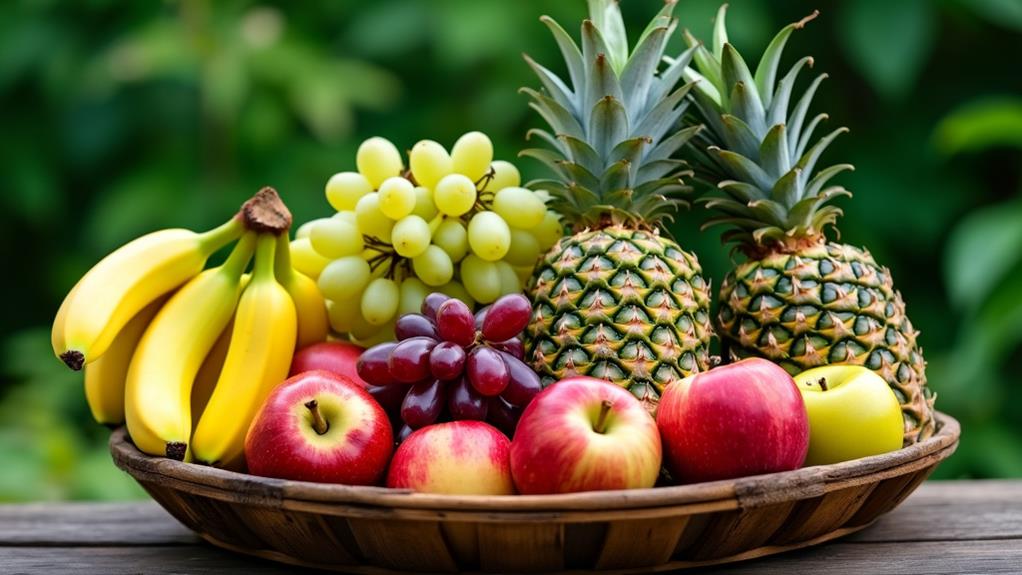
Certain fresh fruits, despite their numerous health benefits, can pose challenges to maintaining a ketogenic diet due to their high carbohydrate content. While fruits are often considered nutrient-dense, many contain sugars that can quickly disrupt ketosis.
For those adhering to a strict ketogenic regimen, it is essential to be mindful of fruit serving sizes and opt for keto-friendly fruits. Additionally, some fruits can cause blood sugar spikes, which can further complicate maintaining ketosis.
Here are three high-carb fruits to avoid:
- Bananas: Each banana contains over 20 grams of net carbs, making it easy to exceed daily carb limits with just one serving.
- Grapes: With approximately 18 grams of carbs per cup, grapes are packed with sugars that can hinder ketosis.
- Mangos: A single mango can contain around 25 grams of net carbs, markedly impacting your carb intake.
Conversely, low-carb alternatives like berries—specifically raspberries, which contain only 1.7 grams of net carbs per ¼ cup—can be incorporated into a keto diet without derailing ketosis.
Understanding the carbohydrate content of different fruits and making informed choices allows for better adherence to a ketogenic diet, ultimately contributing to its success.
Chocolate
Chocolate
In the context of a keto diet, it is essential to distinguish between different types of chocolate.
Milk chocolate and white chocolate are generally high in added sugars and should be avoided due to their potential to exceed daily carbohydrate limits.
Instead, look for keto-friendly chocolate brands that use sweeteners like erythritol, stevia, or monk fruit.
Conversely, dark chocolate with at least 70% cacao can be consumed in moderation, provided it contains no more than 6-7 grams of carbs per ounce.
High-Sugar Milk Chocolate
High-sugar milk chocolate poses significant challenges for individuals adhering to a keto diet due to its increased sugar content, typically containing around 12-15 grams of sugar per ounce.
This high sugar level can quickly exceed the daily carbohydrate limits essential for maintaining ketosis. Regularly consuming milk chocolate can lead to blood sugar spikes, thereby undermining the metabolic benefits sought through a keto diet.
Milk chocolate also contains milk solids, contributing to its carbohydrate content, often exceeding 30 grams of carbs per bar.
These factors make it a less suitable choice for those on a keto diet, as they endeavor to maintain low carbohydrate intake.
To visualize the impact of consuming high-sugar milk chocolate on a keto diet, consider the following:
- Carbohydrate Overload: A single ounce of milk chocolate can contain 12-15 grams of sugar, pushing daily carb intake beyond acceptable limits.
- Blood Sugar Spikes: The high sugar content can cause rapid increases in blood glucose levels, disrupting ketosis.
- Nutrient Imbalance: High-sugar milk chocolate lacks the nutrient profile conducive to a keto diet, emphasizing the need for milk chocolate alternatives.
For those seeking keto friendly desserts, opting for dark chocolate with at least 70% cacao and low-sugar options can be viable alternatives.
Keto-Friendly Dark Chocolate
When selecting chocolate suitable for a ketogenic diet, dark chocolate with at least 70% cacao emerges as a favorable option due to its lower sugar content and minimal carbohydrate levels. Such high-cacao content guarantees that the chocolate contains fewer net carbs, typically ranging between 3-7 grams per ounce, contingent upon the brand and specific cocoa percentage.
Dark chocolate's health benefits make it a viable inclusion in a well-structured keto diet. Rich in antioxidants, it can contribute to improved heart health and reduced inflammation. These benefits align well with the objectives of a ketogenic diet, which aims to enhance overall metabolic health.
Additionally, selecting varieties that use sugar substitutes like erythritol or stevia can further reduce carb intake while preserving the desired sweetness.
Despite these advantages, moderation tips are essential. Consuming keto-friendly dark chocolate should be done sparingly to avoid surpassing daily carbohydrate limits. Even though it is lower in carbs, excessive consumption can still impede ketosis.
Consequently, integrating small portions mindfully into your diet can help maintain the balance necessary for achieving ketogenic success. This disciplined approach guarantees that the health benefits are maximized without compromising the dietary goals of ketosis.
Low-Sugar Chocolate Options
Building on the advantages of dark chocolate with high cacao content, another viable option for keto enthusiasts is low-sugar chocolate. These low sugar alternatives typically utilize sugar substitutes like erythritol or stevia, greatly reducing the overall carbohydrate content while still delivering the sweetness necessary to curb chocolate cravings. This allows individuals on a keto diet to enjoy chocolate without jeopardizing their state of ketosis.
Several brands have emerged as reliable sources of low-sugar chocolate:
- Lily's: Known for its extensive range of chocolate bars, Lily's products generally contain 1-2 grams of sugar per serving, making them a suitable choice for keto snacking.
- ChocZero: This brand offers various low-sugar chocolate options, often incorporating natural sweeteners like monk fruit, keeping net carbs low.
- Dark Chocolate with High Cacao Content: While not always marketed as "low-sugar," dark chocolate with at least 70% cacao can be consumed in moderation, containing around 2-3 grams of net carbs per ounce.
When selecting low-sugar chocolates, always scrutinize the ingredient list for hidden sugars and carb content to guarantee compliance with keto guidelines.
Besides being keto-friendly, many of these options also provide health benefits such as antioxidants, making them a nutrient-focused choice for satisfying chocolate cravings.
High-Carb Dairy Products
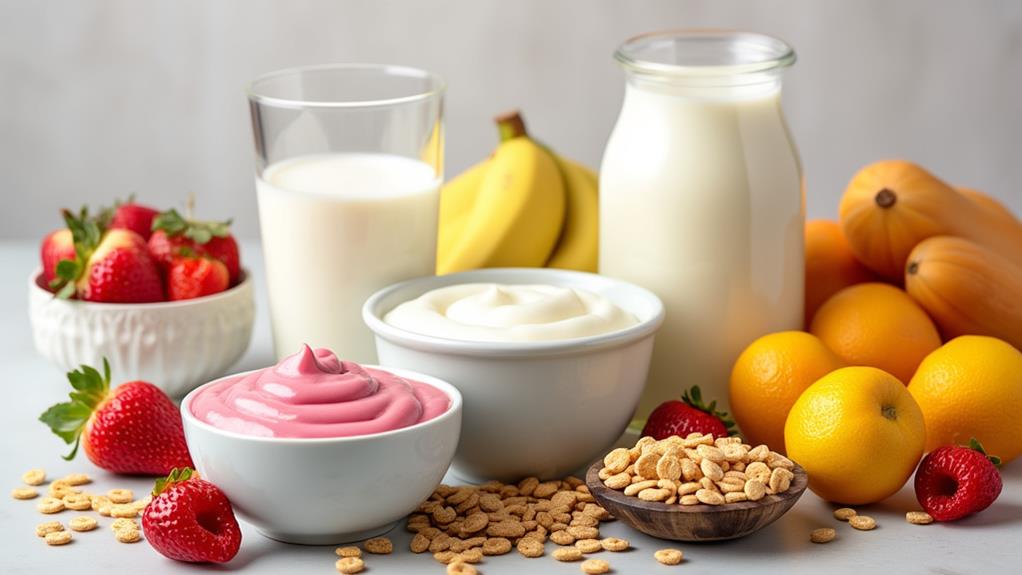
Dairy products can be a significant source of carbohydrates, which may pose challenges for those adhering to a ketogenic diet. Flavored yogurts, for instance, often contain added sugars, leading to a carbohydrate content of 20 grams or more per serving.
Similarly, milk—especially low-fat or skim varieties—contains roughly 12 grams of carbs per cup, making it unsuitable for maintaining ketosis. Ice cream is another high-carb dairy product, with regular varieties providing approximately 28 grams of carbs per half-cup serving due to their high sugar content.
Additionally, certain cheese spreads and processed cheeses pose risks, as they may include added ingredients that increase their carb count, often exceeding 5 grams per serving. Sweetened creamers and other dairy products containing hidden sugars further contribute to a higher carbohydrate intake, contrary to the requirements of a ketogenic diet.
For those seeking to maintain ketosis, considering dairy alternatives and cheese substitutions is essential. Opting for unsweetened almond or coconut milk, as well as hard cheeses with minimal carbohydrate content, can help manage carb intake effectively.
Including digestive enzymes when consuming higher-fat dairy can also support smoother adaptation to a keto lifestyle. By making informed choices, individuals can better align their dietary habits with the principles of a successful ketogenic lifestyle.
Fast Food Items
Maneuvering the landscape of fast food while adhering to a ketogenic diet presents numerous challenges due to the high carbohydrate content inherent in many menu items. Fast food items such as burgers, fries, and chicken tenders are typically laden with carbs that can derail ketosis.
For instance, a standard burger with a bun can contain upwards of 30g of carbohydrates, making it unsuitable for a keto diet. French fries, a popular side, are high in starch and can add approximately 34g of carbs per medium serving, further complicating adherence to low-carb eating.
Moreover, chicken nuggets and tenders, often breaded, can exceed 20g of carbs per serving, posing another obstacle. Milkshakes and sweetened beverages, ubiquitous in fast food establishments, can contain more than 50g of sugar and carbs per serving, far exceeding daily keto limits.
Even seemingly healthy options like salads can be deceptive, with high-carb dressings and toppings adding 15-30g of carbs.
To navigate these pitfalls, consider the following fast food alternatives:
- Bun-less Burgers: Opt for burgers without buns to greatly reduce carb intake.
- Grilled Chicken: Choose grilled over breaded chicken for a keto-friendly option.
- Unsweetened Beverages: Stick to water, unsweetened tea, or black coffee.
High-Carb Condiments

Steering through the intricacies of a ketogenic diet extends beyond just avoiding fast food items; even seemingly minor additions to meals, such as condiments, can greatly affect carbohydrate intake. High-carb condiments like ketchup, which contains approximately 3g of carbs per 9-gram packet, can quickly accumulate, potentially disrupting ketosis.
Likewise, barbecue sauce typically contains about 4g of carbs per packet, rendering it unsuitable for maintaining low carbohydrate limits essential in a keto diet.
Sweet chili sauce is particularly detrimental, with around 15g of carbs per 35-gram serving, posing a significant risk to those strictly monitoring their carb intake. In addition, many commercially available salad dressings are laden with hidden sugars, emphasizing the importance of scrutinizing labels carefully to avoid inadvertent carb consumption.
To maintain the low-carb requirements of a ketogenic lifestyle, it is advisable to opt for keto friendly alternatives. Vinegar-based sauces or mustard generally have lower carb counts and fit well within low carb recipes.
Low-Fiber Foods
Steering a ketogenic diet necessitates careful consideration of fiber intake, as consuming low-fiber foods can have adverse effects on digestion and overall health. Low-fiber foods, such as processed grains and sugary snacks, can hinder digestion and lead to constipation, a common issue on the keto diet.
Additionally, many low-fiber vegetables, including potatoes and corn, are high in carbohydrates and should be avoided to maintain ketosis.
To guarantee digestive health and successful adherence to the ketogenic diet, it is vital to incorporate keto friendly fibers into your meal plans. Here are three categories of low-fiber foods to avoid:
- Processed Grains and Sugary Snacks: These include white bread and pastries, which lack fiber and contribute to rapid spikes in blood sugar levels, potentially disrupting ketosis.
- High-Carb Vegetables: Vegetables like potatoes and corn are not only low in fiber but also high in carbohydrates, making them unsuitable for a keto diet.
- Low-Fiber Fruits: Fruits such as bananas and grapes contain high amounts of sugars that can exceed daily carb allowances, undermining the diet's effectiveness.
In contrast, high-fiber, low-carb options like leafy greens and avocados are essential for maintaining digestive health and overall success on the keto diet.
High-Carb Sauces

When adhering to a ketogenic diet, vigilance over carbohydrate intake is essential, and high-carb sauces can be a hidden pitfall. Many popular condiments and sauces contain considerable amounts of carbohydrates, which can quickly add up and jeopardize ketosis.
For instance, ketchup contains approximately 3 grams of carbs per 9-gram packet. While this may seem minimal, frequent use can accumulate, impacting daily carb limits.
Equally concerning is barbecue sauce, which generally contains around 4 grams of carbs per packet. Meanwhile, sweet chili sauce is particularly problematic, with about 15 grams of carbs per 35-gram serving. Such high-carb content can greatly disrupt a carefully managed ketogenic diet.
Pre-made salad dressings and other sauces often harbor hidden sugars, sometimes exceeding 10 grams of carbs per serving, making them detrimental to ketosis.
To navigate these challenges, it is vital to engage in diligent carb counting and opt for low-carb sauce alternatives. Vinegar-based dressings and mustard are excellent choices that can provide flavor without the excess carbs.
Frequently Asked Questions
What Foods Should I Avoid on a Keto Diet?
To adhere to a ketogenic diet, avoid high-carb foods such as grains, starchy vegetables, high-carb fruits, sugary snacks, and processed foods. Instead, opt for keto-friendly snacks, and be cautious of hidden carbs in various products.
What Foods Can You Eat Unlimited Amounts of on Keto?
On a keto diet, you can consume unlimited amounts of non-starchy vegetables, leafy greens, and high-quality meats. Additionally, incorporating healthy fats and low carb snacks, such as hard cheeses, can support nutrient intake and ketosis maintenance.
What Foods Kick You From Ketosis?
Foods high in refined carbohydrates, starchy vegetables, sugary items, high-carb fruits, and processed snacks can disrupt ketosis. Misunderstanding keto misconceptions and inadequate carb counting can lead to unintentionally consuming excessive carbs, thereby hindering your ketogenic progress.
What Are the 9 Rules of Keto?
The nine rules of keto include limiting carbohydrate intake, avoiding high-carb foods, focusing on healthy fats, moderating protein consumption, staying hydrated, maintaining electrolytes, tracking macros, understanding keto benefits, and dispelling keto misconceptions for ideal success.
Conclusion
Adherence to the ketogenic diet necessitates the exclusion of certain food categories to optimize metabolic outcomes. Avoiding refined carbs and grains, starchy vegetables, sugary foods and snacks, alcoholic beverages, sweeteners and syrups, fast food items, high-carb condiments, low-fiber foods, and high-carb sauces is vital. These items can impede ketosis and hinder fat metabolism. A nutrient-focused approach, emphasizing low-carbohydrate, high-fat foods, is essential for the success of the ketogenic dietary regimen.

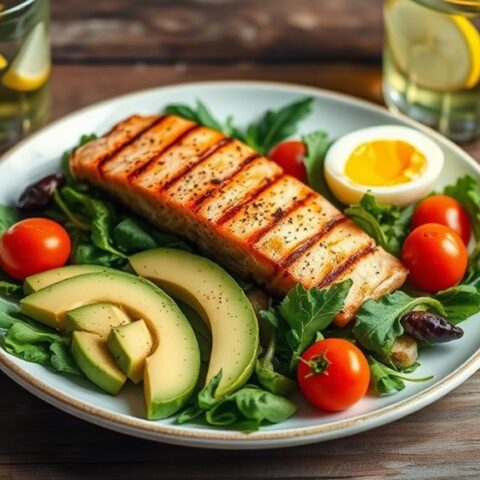



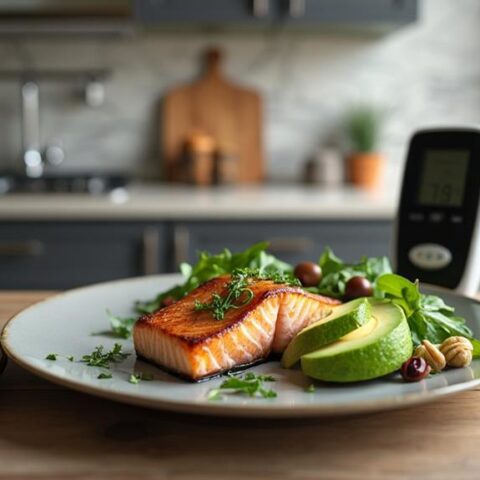




No Comments